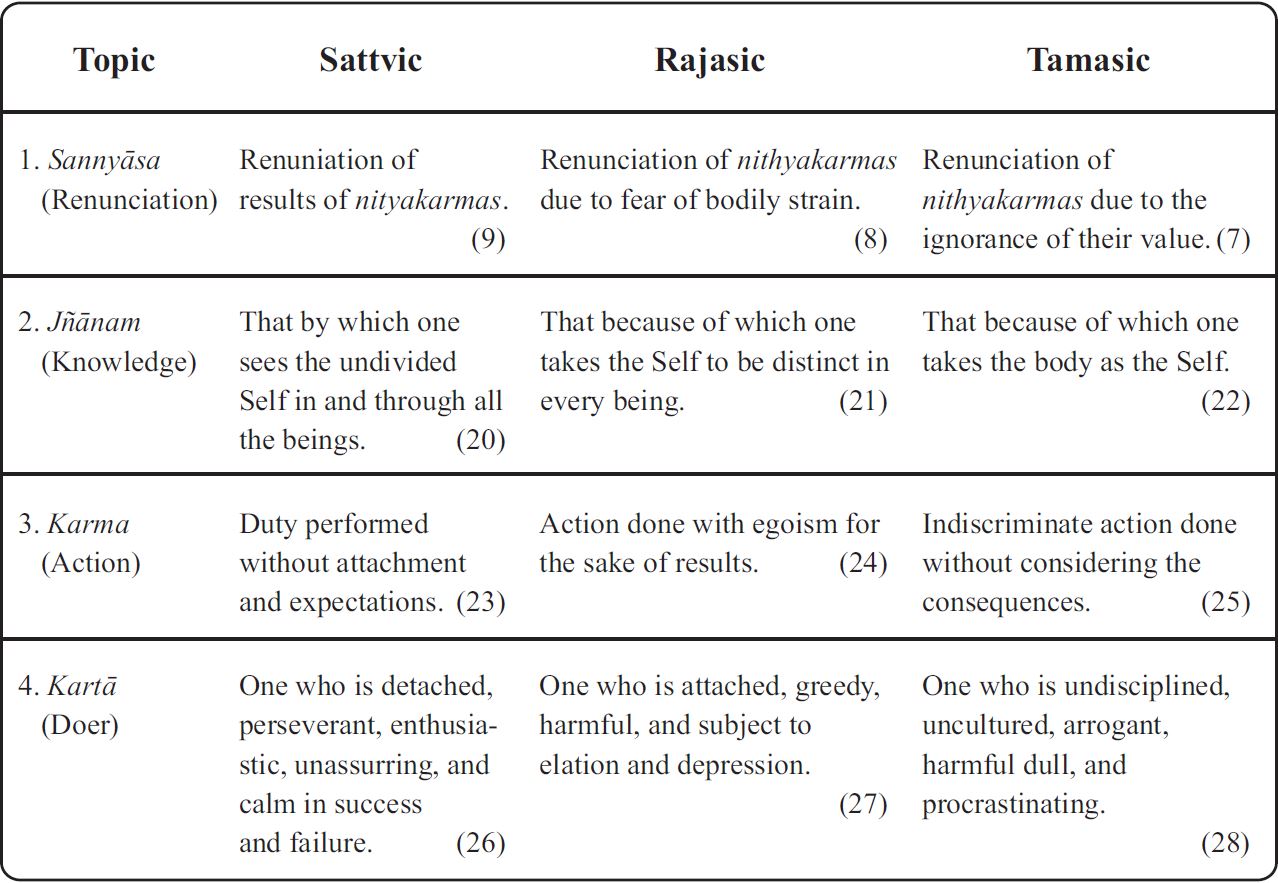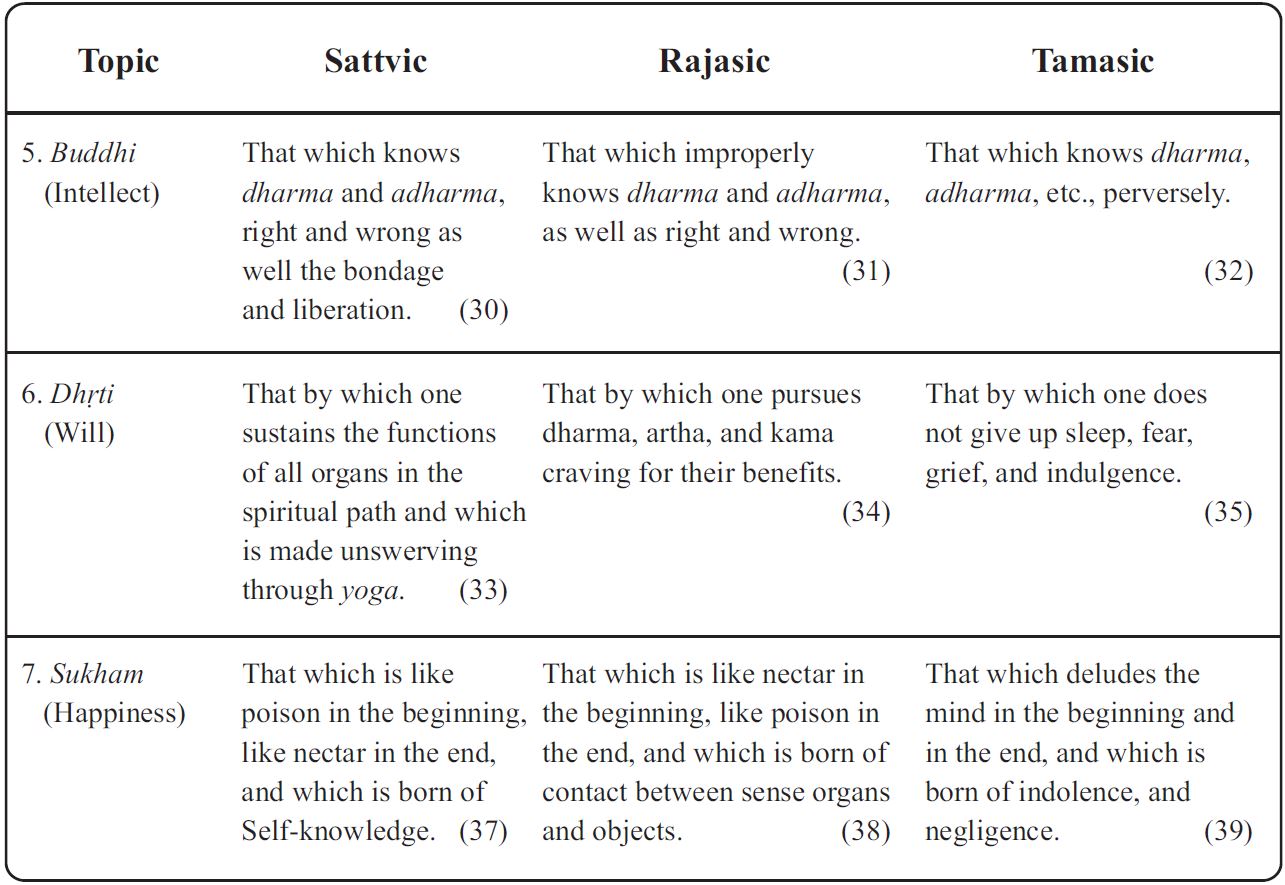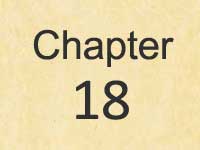
मोक्षसंन्यासयोग
Mokṣa-Yoga - The Yoga of Liberation
The concluding chapter of the Gita is essentially a summary of the entire Song of the Lord. In response to Arjuna’s opening question, the Lord differentiates mere abandonment from true renunciation and explains that renunciation of the false identification with matter and surrender to the Lord is guaranteed to lead us to Liberation. Below are the main themes of Chapter 18:
Verses 1 - 12
Sannyāsa and tyāga
Verses 13 - 17
Jñānayoga
Verses 18 - 40
Three types of knowledge, action, doer, intellect, will and hap-piness
Verses 41 - 49
Karmayoga (emphasizing svadharma)
Verses 50 - 55
Jñānayoga (emphasizing meditation)
Verses 56 - 62
Karmayoga (emphasizing devotion)
Verses 63 - 66
Final summary
Verses 67 - 73
Lord’s concluding remarks
Verses 74 - 78
Sañjaya’s concluding remarks
Gita Chapter 18 - 78 Verses
Chapter 18 - 78 Verses
Commentary by Swami Paramarthananda
Background
Lord Krishna dealt with Self-knowledge in the XIII, XIV and XV chapters. In the XVI and XVII chapters were discussed the values without which the mind will not be fit to receive the knowledge of the Self. With this, the Lord has exhaustively dealt with all the aspects of vedantic teaching.
In such a situation, Arjuna puts his last question to Krishna seeking to clarify the difference between sannyāsa and tyāga. Now begins the XVIII chapter answering Arjuna’s question. Bhagavān takes this opportunity to sum up His entire teaching which has been spread over the last sixteen chapters.
The chapter begins with Arjuna’s question — “Oh Lord! I desire to know the true nature of sannyāsa and tyāga distinctly” (1). Krishna replies by citing the views of some people (2, 3). The Lord gives his verdict from the 4th verse onwards. Bhagavān does not differentiate sannyāsa and tyāga. (This indicates that they are not different according to the Lord.) Krishna emphasizes the importance of obligatory rites (nityakarma) like yajña, dāna and tapas, and asserts that they should never be given up (5, 6) (We should note that this advice is given to people with impurity. Śāstras allow a person with purity to renounce nityakarma also). In the next three verses, the Lord divides renunciation into three types — tamasic, rajasic and sattvic. (For details see the chart)
In the following verses, Bhagavān glorifies sattvic renunciation. (In fact, sattvic renunciation is nothing but karmayoga.) A karmayogī renounces all the results of action. In due course he gets Self-knowledge. He is not affected by the consequences whether they are good, evil or a mixture of both (10 to 12).
From the 13th to the 17th verse, Krishna gives a gist of jñānayoga. Five factors are involved in every action — the body, prāṇa, the mind with sense organs, the ego and the presiding divinity of all these. (In short, they are the four kośās and the presiding divinity) (13, 14). All actions, good or evil, are accomplished through these five factors only (15). The Self is not involved in any action. But, due to identification with the above factors, one mistakes oneself to be a doer (16). On the other hand, the wiseman, who does not have the false ‘I’ (ahaṅkāra) born of identification, is free from all karmas in spite of the activities of his equipments. He is neither a doer, nor an enjoyer (17).
Taking a diversion, Bhagavān introduces six factors necessary for any vyavahāra (transaction). They are — knower, knowledge, known, doer, action and the instrument of action (18). Of these six factors, Krishna takes up three (knowledge, action and doer) for further division based on the three guṇas (19). Later, the Lord divides the intellect and will also on the same basis (29). Finally, Krishna talks about three types of happiness (36). (For details see the chart)

 Krishna concludes this topic by pointing out that there is nothing in the creation which is free from these three guṇas (40).
Krishna concludes this topic by pointing out that there is nothing in the creation which is free from these three guṇas (40).
With an intention to sum up the entire Gītā-teaching, Bhagavān gives the essence of karmayoga (41 to 49) and jñānayoga (50 to 55) in the following section.
Having thus concluded the teaching, the Lord states the qualifications necessary to receive this. One who has no faith, discipline, devotion and desire to know should not be given this knowledge (67).The duties of the four varṇas (brāhmaṇas, kṣatriyas, vaiśyas and śūdras) are prescribed in the scriptures based on their nature (41 to 44). Karmayoga is the performance of one’s own duty as an offering to the Lord. This renders the mind fit for knowledge (45, 46). Here, Krishna makes it a point to emphasize the importance of svadharma (duty). It is necessary not only for the sake of purity but for the sake of social harmony also. Shriking one’s duty can only lead to total confusion (47, 48). The purified seeker, who is detached and self-controlled, will soon attain liberation through jñānayoga (40).
Now the Lord introduces jñānayoga and gives a brief outline of meditation i.e. nididhyāsanam (which is necessary to assimilate the knowledge gained through śravaṇam and mananam). Having restrained all organs and having given up all disturbing thoughts like desire, anger etc., one should remain in a secluded place (51 to 53). Being firmly established in his Brahman-nature, he becomes free from grief and desire. Being the same to all beings, he enjoys the highest devotion to the Lord (54). Having known the Lord in His true nature, he becomes one with Him (55). (Becoming one is nothing but dropping the notion of division.)
In the following verses (56 to 63), Krishna comes back to karmayoga, emphasizing the aspect of devotion i.e. the attitude of surrender. Constantly remembering the Lord, if one dedicates all his actions to Him, that devotee attains the Lord ultimately by effortlessly crossing over all obstacles (56 to 58). On the other hand, if one tries to evade his duty, which is based on his nature, it will be in vain and harmful (58 to 60). Hence, surrendering to the Lord of the heart, the controller of all, a devotee should strive to attain supreme peace by His grace (61 to 62). With this, Bhagavān concludes the teaching and directs Arjuna to do whatever he likes (63). But, the affection towards Arjuna overpowers Krishna once again (64). Hence, the Lord repeats His teaching emphatically once again — “Fix the mind on Me. (Be) My devotee. (Be) My worshiper. Surrender to Me. You shall reach Me alone. Truly do I promise to you. You are dear to Me. Having renounced all actions, seek Me, the nondual, (as your) shelter. I shall liberate you from all sins. Do not grieve” (65, 66). (These two verses are presenting karmayoga and jñānayoga in capsule form.)
Now comes the phalam. One who imparts and the one who receives this wisdom attain the Lord Himself (68 to 70). Even the one who merely hears this with faith attains higher worlds (71).
Being satisfied with the teaching, Krishna asks Arjuna whether his delusion is gone. Arjuna gratefully acknowledges, promising to abide by the Lord’s teaching (72, 73).
Now Sañjaya addresses Dhṛtarāṣṭra, exclaiming how blessed he was to listen to this glorious dialogue between the Lord and Arjuna (74, 75). Sañjaya remembers the whole dialogue and the cosmic vision with thrill (76, 77). He concludes his remarks with the declaration — “Where there is Krishna, the Lord of yoga, and where there is Arjuna, the wielder of the bow, there will be permanent wealth, victory, prosperity and justice” (78).
The topics of this chapter are:
- Sannyāsa and tyāga: 1 to 12
- Jñānayoga: 13 to 17
- Three types of knowledge, action, doer, intellect, will and happiness: 18 to 40
- Karmayoga (emphasizing svadharma): 41 to 49
- Jñānayoga (emphasizing meditation): 50 to 55
- Karmayoga (emphasizing devotion): 56 to 62
- Final summary: 63 to 66
- Lord’s concluding remarks: 67 to 73
- Sañjaya’s concluding remarks: 74 to 78
Since the chapter begins with Sannyāsa which is the means of liberation, it is called Mokṣasannyāsa-yoga.

